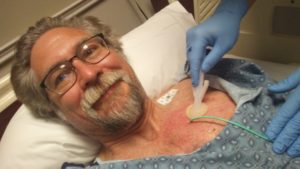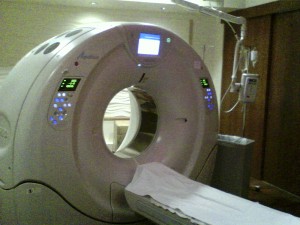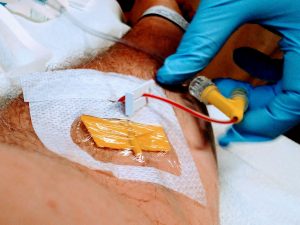Trigger Warning: Graphic and Bloody Content Related to Medical Treatment
Also, there is a link to my podcast, equally scary.
I call the following picture “Why I Can’t Have Nice Things…” Continue reading Inability To Write
Trigger Warning: Graphic and Bloody Content Related to Medical Treatment
Also, there is a link to my podcast, equally scary.
I call the following picture “Why I Can’t Have Nice Things…” Continue reading Inability To Write
I have friends who are long distance runners and I have watched them struggle through their pain to achieve their goals. Although I used to train for both cross country and track way back in middle-school, I can no longer run. But I do understand a thing or two about the process. And I appreciate what it means to endure hardships in search of a personal reward.

At the end of May, I began participating in a clinical trial for Poziotinib, a new targeted therapy that works on mutations in the EGFR and HER categories. Naturally, within days of my May 23rd start, I had already begun exhibiting side-effects from the new medication. The resulting rash has persisted and spread, morphing into a completely new experience for me. I thought at the time that the minor ordeal I had in preparing for the clinical trial would have been the biggest challenge of the trial itself: first I went in for a “simple” needle biopsy procedure, then I had to stay to deal with the effects when things did not go exactly according to plan. The experience even inspired an opinion piece for the Philadelphia Inquirer. But I passed over that (still relatively minor) road bump and ran headlong into the clinical trial and resulting crash back into Rashville.
Having a rash does not sound all that bad in the grand scope of things. A little salve, a dollop of willpower, and it should be easy to weather. Itching too much? Slip on some gloves or spray it with lidocaine. Rashes pass. At least it is not nausea or debilitating pain or sleeplessness. Well, at least it is not nausea. Continue reading Endurance and Payoff
Let’s get one thing straight: emotions do not cause disease. The fault of your physical illness very likely lies with something other than you. The whole notion that anything from kidney stones to cancer could be traced back to an emotional block, repressed anger, wrongs un-righted, or any other random psychological hurt from this life or a past one, is so corrupt that it should never be given credence by any rational being. Yet throngs of people with well-intentioned sounding titles like “life coach” or “healer” spread these malicious little bits of victim blaming as if they were offering salvation in a bottle of snake oil.
That said, I want it to be clear that not everyone who identifies as a healer is guilty of either victim blaming or willfully misleading those who they are trying to help. I’ve known incredibly sincere, warm, compassionate people who do their absolute best to improve the health and well-being of others through a wide swath of tools and approaches, arguably with strong results. And, frankly, many people need some form of guidance in their lives and have relied successfully on many such “coaches” to get where they need to be. I’m not condemning whole industries or forms of practice or even job titles here; this isn’t about valid occupations, but rather about those who choose to exploit the fears and insecurities of patients under the guise of offering miraculous cures through attitude adjustment. Continue reading Emotional Illness
In my first Self-Care Challenge, I encouraged better and more sleep.
In my second Self-Care Challenge, I focused on nutrition and weight management.
This time around, I want you to join me in working on better exercise habits.
Exercise is essential for a variety of reasons, as we all know. My concerns are centered on the importance of building and maintaining muscle mass as well as ensuring optimal functioning of the lymphatic system. I’ll be chronicling my own progress with the MyJournal function of the Health Storylines app that I’ve been using to track my medication side-effects and remind me of my dosing schedule. I am not naturally inclined to exercise, at least not in any scheduled way, so having an app that automatically reminds me when things are due is helpful — and I like keeping track of whether or not I accomplished my daily goals in one place.
For purposes of this challenge, I am going to break the exercise down into two categories. The first is simple: just walk more. The second is weight training, but this does not have to be an aggressive regimen done at the gym. My plan is to keep it simple and not push my body too hard, but the load, of course, is up to you. Continue reading Self-Care Challenge #3: Exercise
Welcome to the next exciting edition of my Self-Care Challenge! Feel free to follow along in the Health Storylines app that I use to journal my progress. Or let me know about your progress below in the comments. (There are a few advantages to using an app to track your progress, which I’ll reference below.)
This time I am focusing on nutrition — specifically, nutrition and weight management.
As you may know from following my blog or my social media posts (links in the right column of this page), I lost a fair amount of weight in February. Being down over 20 pounds as a result of radiation to my intestines and then a bout of the stomach flu took quite a toll on me. Not only did I look a lot different, but I felt weak and, of course, my clothes no longer fit me — not even my “skinny” clothes. Fortunately, I started regaining some of that weight quickly and managed to put on about ten of the lost pounds within a couple of weeks. Continue reading Self-Care Challenge #2: Nutrition
We all know — or we should all know — that lung cancer is one of the biggest killers in our society. With an estimated average of 433 people dying every day from some form of this disease, there is no question as to why it is considered such a horrifying diagnosis. Lung cancer kills more than any other cancer, and more than its three closest competitors in the cancer arena combined. If there were cancer cage matches, lung cancer would win virtually every time based on the sheer volume of its devastation and mayhem. Yet, in spite of receiving only a fraction of the research funding that other cancers get, a surprising number of treatments have emerged to help lung cancer patients outlive their initial prognosis.
But you have lung cancer! You’re expected to die. And, by the way, you’re expected to die quickly (and brutally). That is what the common narrative tells us.
Lung cancer treatment has made amazing bounds over the past decade. For a growing number of patients, living with Stage IV lung cancer is no longer an immediate death sentence, if a death sentence at all. For some of them, especially those diagnosed “earlier” in the Stage IV spectrum, while there are still a few months to alternate between treatments to find what works, or for those lucky enough to have an actionable mutation, even this advanced type of lung cancer can be treated as a chronic illness instead of a fatal one. Earlier and better diagnoses have led to younger and healthier patients having a chance to engage in this challenge before their cancer has beaten them down from within, and they have brought a new level of perseverance to the process. Continue reading The Overstayed Welcome
It all started with a pain in my back. I was a mess. Every day, the pain grew and spread until it ran down my entire left leg and shot up into my chest. What I had hoped might be a simple pinched nerve turned out to be the result of a new metastasis in the muscle of my lower back, conveniently pressing gently up against the sciatic nerve like a feather made of barbed wire attached to a cattle prod.
To treat this nasty beast, the only practical solution was to zap it with radiation — something that I could barely wait to begin doing. By the time this was presented as an option, I was in such agony that surgery would have been appealing. Radiation, by comparison to virtually anything else, sounded like a relief. Continue reading Radiation and Me, A Love Story
It has been over two weeks since I began taking my new drug, afatinib. Over two weeks of feeling good, feeling like the chemo has been thoroughly flushed from my system even as I have diligently taken these new pills, feeling the best that I have in three years. I have been keeping a journal this time, chronicling how my body is responding each day, trying to pave the way for a better understanding of how to live with this new treatment. For the first week, anyway, it almost seemed like it was going to be too easy.
There are two weeks of video updates on my Patreon feed, talking about how great I feel and wondering how bad the side effects will be once they really kick in. I had been prepped by my oncologist that it was very likely that I would experience worse side effects than I had with the chemo I had been taking. This was based on how well I tolerated pemetrexed, the chemotherapy drug that had kept my cancer at bay for so long, but not so much on patients in general having a particularly tough time on afatinib. Which is not to suggest that I expected a walk in the proverbial park with this new drug.
Still, the first week was amazing. It was almost like I was taking nothing at all. Sure, there was some digestive stuff going on, but nothing outside of the realm of what I would have been used to in a previous life if I decided to live off of bean burritos for a few weeks. And I love a good burrito, so it would be worth it. But by day eight, I realized that the side-effects of the drug were presenting themselves quite visibly. Continue reading Spoiler Alert: Side-Effects Show Up
My recent post on dealing with change and adversity was inspired in no small part by a change I am facing in my own life, one rife with uncertainty and heavy with anticipation. The last CT scan I had showed that my primary tumor, the one by which we gauge progression or lack thereof, was still within the technical boundaries of business as usual. That is to say, its lateral dimensions had not changed significantly since the previous scan, and overall had not grown enough over the similar measurements from a year or two years ago to precipitate anxiety. But CT scans are, for lack of a better term, a bit fuzzy. The images are fairly clear, but the data is difficult to measure with absolute precision.

Because CT scans are essentially three-dimensional, but are viewed on two-dimensional screens, comparisons between scans are inherently imprecise. The angle of a subject’s body, how inflated the lungs were, the position of the subject within the imagining chamber, all figure into subtle differences between the final scans. On top of that, because the images are basically multitudes of cross-sectional snapshots, a comparison must be made by selecting the closest approximation to the “same” image between scans from different times. I’ve looked at lots of these — in fact, I keep digital copies of all my scans for reference or posterity — and I’ve used the tools to line up and measure my tumor as best I can.
And in two dimensions, at the standard viewing cross-sectional approximation, my mass looks very similar from scan to scan, every three or so months since this process began. My chemotherapy was clearly doing what it was intended to do, which was to prevent progression of the disease. Progression is generally defined in terms of the length of the tumor, but we all know that tumors are bundles of cells that grow and change along more than just one axis.
I was never under any illusion that the chemo would cure me — there is no official cure for Stage 4 Lung Cancer. Any time that the chemotherapy could afford me by maintaining stasis has been considered a luxury and at over two and a half years on this particular regimen, I have been the longest continuous success case that many on my medical team have known. So the next time I see most of them will be a special, bitter-sweet occasion.
Because the time for change has come. Continue reading Chemo and I Had a Pretty Good Run

My story begins this way, elliptically, perhaps by design or perhaps because this is two days into my cycle… 48 hours ago, I was sitting in a comfortable chair at my chemo spa, settling back for a needle while a warm massage pulsed against my back. This was my 38th or 39th infusion since I began chemotherapy in December of 2014, almost exactly 2.5 years ago as I write this, on consistent three-week cycles with only one or two exceptions made for travel. As a Stage IV NSCLC patient, I suppose this makes me a “lucky” fellow because I tolerate my treatment well and seem to be holding steady through each of my scans. Life isn’t what I used to expect it to be, but that isn’t all bad. I’ve learned a few new tricks, I’ve changed my focus, I’ve accepted some limitations and tried to defy others.
In June of 2014, I was, as they say, the “picture of health.” I was working out again, moderately at least, for the first time in years; I was excited about starting a new phase in my career and had begun actively interviewing for positions that would give my life new structure and alleviate a huge amount of the stress I was under financially and emotionally. It had been a complicated few years leading up to this point and I had been paying for a few poor decisions, some unforeseen misfortune in the housing market, a few stumbling blocks in my home life, and regrets that I should never have allowed to affect me (but I had). Before this, I had a relatively successful career in film and video production, mostly in commercials but with a few independent movies under my belt and forays into other mediums, but the work itself was costing me a connection with my new daughter and domestic strain that was simply not worth exacerbating. So I decided to phase that work out and focus on what I loved, which was writing.
And I had some early success. A few inroads were made with some of my work, but ultimately it wasn’t enough and I tried a number of options to keep myself going for a year, then another, then one more… By the time my daughter was 8, I realized that I needed to alleviate the burdens that had been increasingly placed upon my wife so that I could make my writing pay off, and I began pursuing work in media production again, but this time as a staff member with an established company rather than as the freelancer I had always been. I wanted something that could be counted on, with a salary and a 401K and regularity — things I had not had at my disposal in many years. I had health insurance through my wife’s work, which was actually very good, and for which I would soon be grateful. Continue reading My Story: Lung Cancer and Chemo and a Changed Life